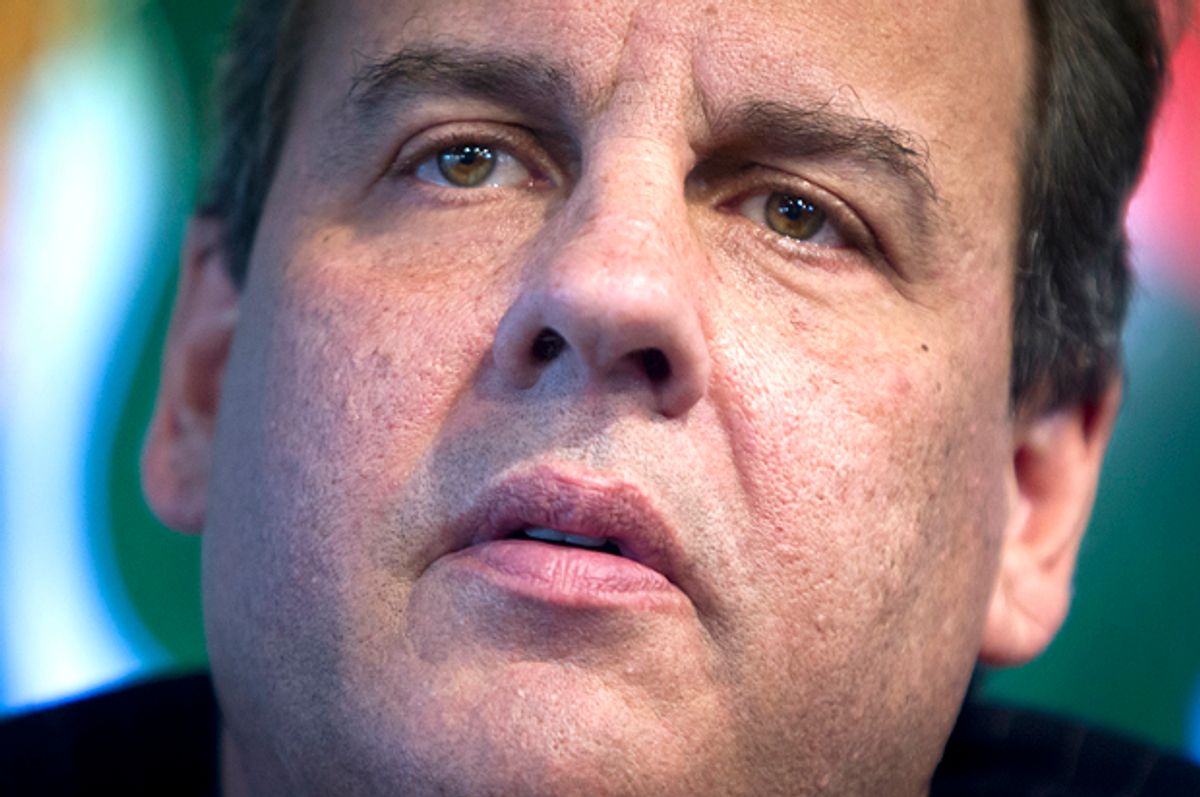New Jersey governor Chris Christie is out with a brand new tax plan. Well, perhaps “plan” is too strong a term – it’s more accurate to say that he’s written a lot of words about taxes in an op-ed for the Wall Street Journal, and some of those words could conceivably form the basis of a tax plan should Christie decide to run for president in 2016. And the overall message of Christie’s tax vision can be summed up in one word: Reagan.
There’s a tax policy debate raging within the conservative movement, pitting the supply-side traditionalists, who view marginal rate cuts for top earners as the “secret sauce” to generating economic growth, against the “reform conservatives” who think the tax code should focus more on middle-income earners. Christie’s plan pays absolutely zero attention to the reform conservatives and focuses exclusively on lowering marginal rates just like good ol’ Saint Ronnie did back in the ‘80s:
Let’s lower the rates for every American by simplifying the income-tax system to just three individual income-tax rates, instead of the current six. The top rate should be no higher than the 28% set in the country’s last major successful tax-reform effort—the Bradley-Gephardt reform during the Reagan era. And the bottom rate should be a single digit.
Lowering taxes for everyone and slashing the top rate from its current 39.6 percent to the maximum 28 percent prescribed by Christie will, of course, send revenues plummeting. But don’t worry, deficit hawks: Christie’s got you covered. “We should eliminate or modify enough deductions, credits and targeted provisions in the code—both on the personal and the corporate side—to ensure that the plan, combined with other measures I am proposing, is revenue-neutral and doesn’t materially increase the deficit.”
Well that’s certainly vague! Of course, he does single out two specific deductions that, in his view, shouldn’t be touched: “The deductions for charitable contributions and for interest on home mortgages—at least for a first home—should remain intact.” These two deductions overwhelmingly benefit top earners, as this handy-dandy CBO chart demonstrates.
So, the Christie tax plan is to slash rates for the wealthy and preserve government handouts for top earners. Congratulations, rich people! You win again!
What’s most galling, though, is Christie’s claim that this tax vision of his will – via tortured statistics and vigorous hand-waving – reduce income inequality:
Finally, these past six years have seen a weak economy combined with a set of monetary policies that were geared for the wealthy, exacerbating the very problem the left loves to harp on: income inequality. The best way to address income inequality is to nurture overall growth. Incomes for most Americans grew during the economically healthy 1980s and ’90s, and inequality increased during the anemic 1970s.
Oh there’s just so much to disassemble here. If lowering tax rates is the key to inequality-busting economic growth, then why is Christie talking about income growth during “economically healthy” 1990s when the top tax rate was at the current, unacceptably high level of 39.6 percent? Also, the suggestion that income inequality didn’t worsen during the ‘80s is completely blinkered. “Incomes for the poorest quintile (i.e., the poorest 20% of the population) rose, on average, by only 0.7% under Reagan,” wrote Timothy Noah in 2014, “while incomes for the richest quintile rose, on average, by 23%.” Ever since the late 1970s, the wealthiest Americans have been vacuuming up a steadily increasing share of national income, with only the odd recession here and there serving as a speedbump to the concentration of wealth at the top.
Christie’s policies, such as they are, would only make it easier for the wealthier to accumulate even more wealth, just like they did under Reagan. And really, it’s laughable for Christie to be talking about economic growth to begin with, given that his own state has lagged behind badly on that very score under his five-year stewardship.


Shares